A cash discount is a marketing and client relations strategy that is often employed to provide consumers with added incentive to do business with a particular company. In some instances, the cash discount has to with a percentage or flat rate discount that is extended when a customer pays an outstanding invoice within a specified period of time. In other situations, the cash discount is applied when a consumer chooses to pay for goods and services using cash currency rather than some alternative form of payment, such as credit cards.
Traditionally, the discount is an offer that is included either in a contractual agreement between a vendor and client. The terms of the offer usually have to do with early payment for an outstanding invoice. As an example, the vendor may issue invoices with a standard payment cycle of thirty days. If the client chooses to remit payment to the vendor within ten days of the issue date on the invoice, a discount of some sort is applied to the customer’s account.

The cash discount may appear as a credit or line item on the next month’s invoice, or be applied to the next purchase. On rare occasion, a vendor may include the terms of the discount on the invoice, with instructions for the customer to pay a slightly lower amount if payment is sent within the window of time specified.
A newer application of the cash discount has emerged in recent years. Some vendors are now offering instantaneous discounts on products if the consumer pays in cash, rather than using a credit card. One example of this approach is with gasoline. Many consumers are not aware that a vendor pays a fee in order to process a credit card payment. In order to entice clients to pay in cash and thus avoid the fee, a vendor will offer discounts off the standard price. The consumer saves a small amount off the regular price, while the vendor avoids paying a processing fee on the transaction.
